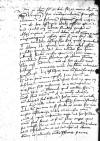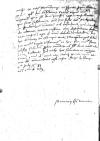Uberiorem et feliciorem fortunam, quam eidem Vestrae Reverendissimae Dominationi his effluxis diebus cesserit, optarem. Nam oppidum eius ⌊Luboua⌋ funditus exustum, non absque ingenti animi mei dolore et non minore iationi(ta)te(!) instead of iactatione⌈iationi(ta)te(!)iationi(ta)te(!) instead of iactatione⌉ anxietateque eram affectus, quam si me ipsum ille ignis terribilis afflixisset. Sed quid querulamur ac dolemus, ubi querelae nec dolor nihil afferunt praesidii, quiescendum divinae voluntati seu huic adversae fortunae censeo, quoniam rerum irrecuperabilium summa felicitas est oblivio. Plurimos similis casus contrivit. Nam et hoc oppidum meum Helsberg in memoria recenti bis similem calamitatem perpessum est, licet hoc tempore meo non factum sit, repperi tamen id in primo meo ingressu paene vacuum et desolatum. Navavi tandem operam hactenus, quo eius tres partes sunt restauratae et in totum restitu(tum) iri brevi tempore, ni similis mali quid accidat, sperem. Tametsi sciam Vestram Reverendissimam Dominationem in omnibus adversis non deiectum, sed constantem habere animum et ea velle, quae Deum velle novit, adversamque fortunam flocci facere, nolui tamen pro meo in se studio et amore his meis ineptis consolatoriis verbis non invisere Vestram Reverendissimam Dominationem, quam vehementer rogo, ut haec humana animo forti ferat et se non plus angat, quam sit necesse. Sic et me et suos benevolentes, alios etiam consolabitur et ut eam Christus ab ulteriore damno ac adversis cunctis praeservet, precor.
 AAWO, AB, D. 8, f. 6v
AAWO, AB, D. 8, f. 6v
Accepi ex actis ⌊Marienburgi⌋ in praeterito proxime ⌊conventu⌋ gestis, quod ⌊domini consiliarii⌋ sacram ⌊regiam maiestatem⌋ rogarunt, quatenus illustrem ⌊ducem Prussiae⌋ etc. interpellaret, quo suos consiliarios etiam pro festo 1533-09-29⌊sancti Michaelis1533-09-29⌋ in ⌊Grudentinum conventum⌋ ad consultandum concludendumque de ulteriore monetae cussione aut destitutione destinaret. Cuperem ego ob meam debilem valetudinem, ut hic conventus in ⌊Elbingum⌋ aut ⌊Margenburgum⌋ saltem per ⌊maiestatem regiam⌋ transferre{re}tur, et hoc sua maiestas facere absque suspicione propter nuntios ab illustri duce mittendos bene valeat, sed mihi hoc sollicitare non convenit.
Vestram Reverendissimam Dominationem iterum atque iterum quieto animo et me illi commendatum esse cupio.
 AAWO, AB, D. 8, f. [1]v unnumbered after f. 6
AAWO, AB, D. 8, f. [1]v unnumbered after f. 6


